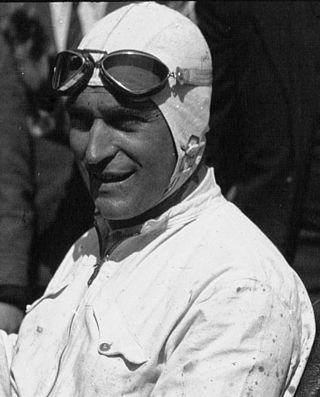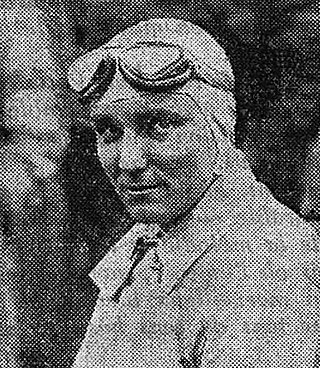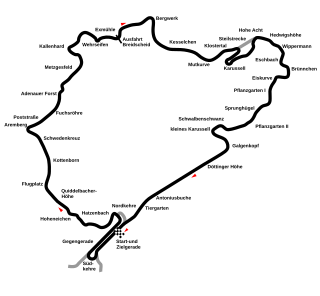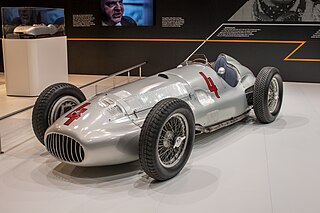
The Automobil-Verkehrs- und Übungsstraße, known as AVUS, is a public road in Berlin, Germany. Opened in 1921, it was also used as a motor racing circuit until 1998. Today, the AVUS forms the northern part of the Bundesautobahn 115.

The German Grand Prix was a motor race that took place most years since 1926, with 75 races having been held. The race has been held at only three venues throughout its history: the Nürburgring in Rhineland-Palatinate, Hockenheimring in Baden-Württemberg and occasionally AVUS in Berlin. The race continued to be known as the German Grand Prix, even through the era when the race was held in West Germany.

Bernd Rosemeyer was a German racing driver and speed record holder. He is often considered one of the greatest racing drivers of his era.

Otto Wilhelm Rudolf Caracciola was a German racing driver. He won the European Drivers' Championship, the pre-1950 equivalent of the modern Formula One World Championship, an unsurpassed three times. He also won the European Hillclimbing Championship three times – twice in sports cars, and once in Grand Prix cars. Caracciola raced for Mercedes-Benz during their original dominating Silver Arrows period, named after the silver colour of the cars, and set speed records for the firm. He was affectionately dubbed Caratsch by the German public, and was known by the title of Regenmeister, or "Rainmaster", for his prowess in wet conditions.

Luigi Cristiano Fagioli was an Italian racing driver, who competed in Grand Prix motor racing from 1928 to 1949, and Formula One from 1950 to 1951. Nicknamed "The Abruzzi Robber", Fagioli won the 1951 French Grand Prix with Alfa Romeo aged 53, and remains the oldest driver to win a Formula One Grand Prix. Fagioli was runner-up in the European Drivers' Championship in 1935 with Mercedes.

Manfred Georg Rudolf von Brauchitsch was a German auto racing driver who drove for Mercedes-Benz in the famous "Silver Arrows" of Grand Prix motor racing in the 1930s.

The Mercedes-Benz W125 was a Grand Prix racing car produced by German auto manufacturer Mercedes-Benz to race during the 1937 Grand Prix season. Designed by head designer Rudolf Uhlenhaut, the car was used by Rudolf Caracciola to win the 1937 European Championship and W125 drivers also finished in the second, third and fourth positions in the championship.

Richard John Beattie Seaman was a British racing driver. He drove for the Mercedes-Benz team from 1937 to 1939 in the Mercedes-Benz W125 and W154 cars, winning the 1938 German Grand Prix. He died of his injuries after his car overturned at the 1939 Belgian Grand Prix.

The 1937 Masaryk Grand Prix was a 750 kg Formula race held on 26 September 1937 at the Masaryk Circuit.

The 1937 Italian Grand Prix was a "750 kg Formula" Grand Prix race held on 12 September 1937 at the Montenero Circuit in Livorno.

The 1937 Swiss Grand Prix was a 750 kg Formula race held on 22 August 1937 at the Bremgarten Circuit.

The 1936 Grand Prix season was the third year of the 750 kg Formula. The next iteration of the Mercedes-Benz did not prove successful and the team withdrew during the season to instead prepare for the next one. It therefore fell to the resurgent Auto Union team to dominate the racing. In particular, it was their young, new superstar, Bernd Rosemeyer, who mastered the tricky car and who showed superlative skill in wet conditions. Rosemeyer easily won this season's European Championship by winning three of the four Grands Prix.

The 1935 German Grand Prix was a Grand Prix motor race held at the Nürburgring on 28 July 1935.

The 1935 Grand Prix season was the second year of the new 750 kg Formula. The success of the previous year encouraged the AIACR to reinitiate the European Championship. It was composed of the seven national Grands Prix and was won by Rudolf Caracciola, driving for the Mercedes-Benz team. The team dominated the season winning five of those Grand Épreuves, as well as four of the other major races of the season. However, in one of the great motor-races in sporting history, Tazio Nuvolari in a Scuderia Ferrari Alfa Romeo beat the combined numbers of the German teams in their home Grand Prix. The season also saw the arrival on the international stage of the bright young talent Bernd Rosemeyer in the Auto Union team.

The 1937 Monaco Grand Prix was a Grand Prix motor race held at the Circuit de Monaco on 8 August 1937. The 100 lap event was won by Manfred von Brauchitsch.

The 1931 Grand Prix season was a watershed year, with the advent of the AIACR European Championship. After several years of Grand Prix racing in the doldrums with little technical development, 1931 saw new models come from all three main manufacturers: Bugatti, Maserati and Alfa Romeo.

The 1932 Grand Prix season marked the second year of the AIACR European Championship. It saw the debut of Alfa Romeo's sensational new Tipo B and with it, Tazio Nuvolari won the Championship driving for the Alfa Corse works team. The 40-year old Nuvolari won two of the three rounds and was second in the other. Still running to a Formula Libre rules for the cars, the regulations were revised to set the races to be between five and ten hours. However, all three national committees ran their races to the minimum time-limit.
The 1934 Grand Prix season saw the advent of the new 750 kg Formula. In an effort to curb the danger of rising speeds, the AIACR imposed this upper weight limit that effectively outlawed the large capacity engines. The incumbent manufacturers Alfa Romeo, Maserati and Bugatti had been preparing their new models with varying success – the best of which was the Alfa Romeo Tipo B. However, it was the state-sponsored arrival of the two German teams, Mercedes-Benz and Auto Union, and their innovative and progressive cars that ignited a new, exciting era of motor racing.

The Mercedes-Benz W154 was a Grand Prix racing car designed by Rudolf Uhlenhaut. The W154 competed in the 1938 and 1939 Grand Prix seasons and was used by Rudolf Caracciola to win the 1938 European Championship.

Otto Merz was a German racing driver, chauffeur and mechanic. He was a driver in the motorcade during the 1914 assassination of Archuduke Franz Ferdinand and later won the second running of the German Grand Prix in 1927. He died in a crash during practice for the 1933 Avusrennen in a modified Mercedes SSK on 18 May 1933.






















